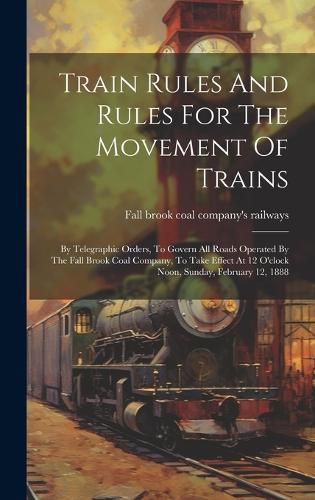Readings Newsletter
Become a Readings Member to make your shopping experience even easier.
Sign in or sign up for free!
You’re not far away from qualifying for FREE standard shipping within Australia
You’ve qualified for FREE standard shipping within Australia
The cart is loading…






Train Rules and Rules for the Movement of Trains by Telegraphic Orders is a manual for operating trains on the Fall Brook Coal Company's Railways. The book provides detailed instructions for train crews on everything from signaling to the handling of hazardous freight. The book is a fascinating look at the technology and logistics of late 19th century railroads.
This work has been selected by scholars as being culturally important, and is part of the knowledge base of civilization as we know it.
This work is in the "public domain in the United States of America, and possibly other nations. Within the United States, you may freely copy and distribute this work, as no entity (individual or corporate) has a copyright on the body of the work.
Scholars believe, and we concur, that this work is important enough to be preserved, reproduced, and made generally available to the public. We appreciate your support of the preservation process, and thank you for being an important part of keeping this knowledge alive and relevant.
$9.00 standard shipping within Australia
FREE standard shipping within Australia for orders over $100.00
Express & International shipping calculated at checkout
Train Rules and Rules for the Movement of Trains by Telegraphic Orders is a manual for operating trains on the Fall Brook Coal Company's Railways. The book provides detailed instructions for train crews on everything from signaling to the handling of hazardous freight. The book is a fascinating look at the technology and logistics of late 19th century railroads.
This work has been selected by scholars as being culturally important, and is part of the knowledge base of civilization as we know it.
This work is in the "public domain in the United States of America, and possibly other nations. Within the United States, you may freely copy and distribute this work, as no entity (individual or corporate) has a copyright on the body of the work.
Scholars believe, and we concur, that this work is important enough to be preserved, reproduced, and made generally available to the public. We appreciate your support of the preservation process, and thank you for being an important part of keeping this knowledge alive and relevant.